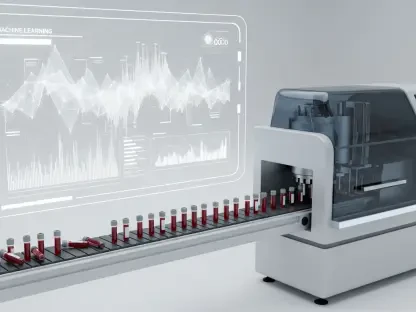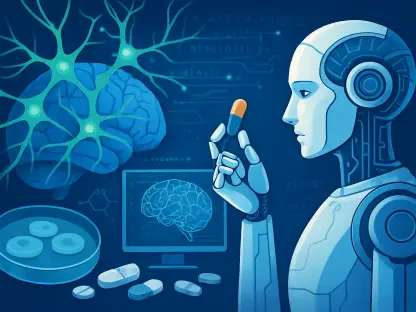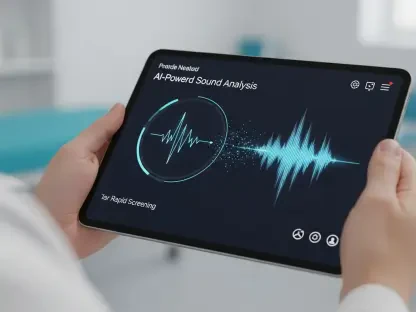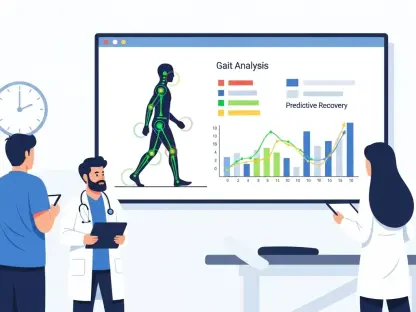Artificial intelligence (AI) is making significant strides in the healthcare sector, revolutionizing the way care is delivered. By automating various processes, AI is not only reducing administrative burdens but also reinforcing the traditional patient-provider care model. This transformation is leading to improved diagnostic efficiency and substantial cost savings, ultimately enhancing overall care delivery.
Alleviating Administrative Burdens
The Growing Challenge of Administrative Duties
Physicians are increasingly burdened with administrative tasks that encroach on their time for direct patient care. This growing challenge has sparked considerable interest in AI solutions that can alleviate these burdens. Due to the relentless rise of documentation requirements, healthcare professionals often struggle to maintain the balance between administrative work and patient care. Enter AI-driven ambient listening solutions, such as the NextGen Ambient Assist developed by NextGen Healthcare. These tools have the potential to automate much of the documentation process by transcribing patient-provider conversations in real time and summarizing encounters almost instantly.
By automating these tasks, ambient listening solutions can reduce the documentation burden by up to two hours a day, allowing doctors to dedicate more time to engaging with their patients. The efficiency and revolutionary potential of these AI tools become particularly evident in specialty-specific customizations. In fields like ophthalmology and optometry, precise documentation is crucial, and the ability of AI to tailor workflows to meet the unique demands of these specialties represents a significant advancement. This shift not only improves the quality of patient care but also enhances the overall patient experience, as physicians can focus more on direct interactions rather than administrative duties.
Real-Time Documentation Solutions
AI-driven ambient listening solutions provide real-time documentation that can vastly improve the workflow of physicians. One notable example is NextGen Ambient Assist, which allows doctors to efficiently manage their documentation needs without compromising the quality of patient interaction. By transcribing patient-provider conversations in real time and generating accurate summaries, these AI tools address one of the most time-consuming aspects of healthcare practice. Such solutions are particularly beneficial in high-volume environments where time is of the essence.
The development and implementation of specialty-specific customizations further highlight the transformative potential of AI-driven real-time documentation tools. For instance, tailored workflows for ophthalmology and optometry address the nuanced challenges of documenting eye exams, ensuring that accuracy is maintained while significantly reducing the administrative load on practitioners. By leveraging AI to handle documentation tasks, healthcare providers in these fields can streamline operations, ultimately leading to more effective and efficient patient care.
Enhancing Diagnostic Efficiency
AI in the Diagnostic Process
AI-enabled technologies are proving instrumental in the diagnostic process by offering decision support for specific diagnoses. These innovations enhance the accuracy and speed of diagnoses by translating patients’ medical records, including disease descriptors, into diagnosis codes (ICD), and by generating relevant lab or imaging orders for providers’ review and approval. This process not only accelerates the diagnostic phase but also frees up healthcare providers to focus more on patient care, ensuring that patients receive timely and accurate medical attention.
The impact of AI on the diagnostic process is profound, with studies and reports underscoring its potential benefits. According to an Accenture report, the annual benefit of preliminary diagnosis driven by AI is projected to reach $5 billion by 2026. AI technologies enable healthcare professionals to sift through vast amounts of data quickly and efficiently, identifying patterns and making connections that may not be immediately obvious. This capability not only enhances diagnostic accuracy but also reduces the likelihood of errors, leading to improved patient outcomes and overall care delivery.
Projected Benefits and Cost Savings
The substantial cost-saving potential of AI technologies in healthcare is further underscored by various industry analyses. McKinsey, for instance, estimates that AI tools could automate nearly 45% of administrative tasks in the healthcare sector, translating into annual savings of $150 billion. These cost savings are not merely theoretical but are already being realized in different areas of healthcare delivery. By streamlining administrative processes, AI allows healthcare organizations to allocate resources more effectively, reducing overhead costs and increasing operational efficiency.
In addition to administrative savings, AI-driven diagnostic tools contribute to cost savings through improved health outcomes. As AI technologies continue to advance, their application in diagnostics can lead to earlier detection of diseases, more accurate diagnoses, and more personalized treatment plans. Harvard’s findings support this notion, suggesting that AI in medical diagnosis can improve health outcomes by 40% and reduce treatment costs by 50%. These improvements underscore the transformative potential of AI in not only enhancing diagnostic efficiency but also in achieving substantial financial benefits for healthcare institutions and patients alike.
Specialty-Specific Customizations
Tailored Workflows for Ophthalmology and Optometry
NextGen Healthcare has developed tailored workflows for ophthalmology and optometry, addressing the unique challenges of documenting eye exams. These specialty-specific customizations are vital for ensuring that documentation accurately reflects the complexity and specificity of these medical fields. Dr. Shannan Brown from Michiana Eye Center in South Bend, Indiana, highlights the efficiency and revolutionary potential of NextGen Ambient Assist in streamlining operations and reducing documentation burdens in ophthalmology and optometry.
By automating tasks that are traditionally time-consuming and prone to human error, AI solutions like NextGen Ambient Assist enable practitioners to focus more on patient care and less on administrative duties. These tailored workflows integrate seamlessly into the daily operations of eye care professionals, enhancing the accuracy and efficiency of documentation. As a result, AI technologies not only improve operational efficiency but also contribute to better patient outcomes by allowing healthcare providers to deliver more attentive and personalized care.
Custom Solutions for Psychiatric Practices
Similarly, NextGen Healthcare has created workflows specific to psychiatric practices. These solutions are calibrated to capture and process the intricacies of mental and behavioral health conversations, ensuring that documentation is both accurate and efficient. The needs of psychiatric practices differ significantly from other medical specialties, and the ability of AI to adapt to these unique requirements highlights its versatility and potential for wide-ranging applications in healthcare.
The integration of AI in psychiatric practices illustrates the adaptability and effectiveness of these technologies in handling complex and nuanced medical information. By automating the documentation of patient-provider interactions, AI-driven solutions reduce the administrative burden on psychiatrists, allowing them to focus more on providing quality care to their patients. This customization highlights the versatility and adaptability of AI technologies in meeting the diverse needs of different medical specialties, ultimately improving the overall standard of healthcare delivery.
Addressing Privacy and Security Concerns
Handling Sensitive Data with Care
The adoption of AI in healthcare is not without its challenges, particularly concerning privacy and security. AI systems often collect and analyze personal information, including sensitive medical, genetic, and lifestyle data, raising significant concerns about data protection and patient privacy. It is crucial for healthcare organizations to handle AI usage with utmost care to protect patient information from potential breaches or misuse.
Addressing these concerns requires a multifaceted approach that encompasses robust data security measures, strict privacy policies, and transparent data handling practices. Healthcare providers must ensure that AI systems comply with regulatory standards and ethical guidelines, prioritizing patient privacy and data protection at every stage. By implementing stringent safeguards and maintaining transparency, healthcare organizations can mitigate the risks associated with AI adoption while leveraging its benefits to enhance care delivery.
Ensuring Patient Privacy
NextGen Healthcare prioritizes patient privacy by not storing or saving audio or transcripts, thereby addressing potential privacy issues associated with AI-driven ambient listening solutions. This approach ensures that while AI technologies enhance care delivery, they do so without compromising the confidentiality and security of patient information. By adopting such measures, NextGen Healthcare sets a standard for responsible AI usage, balancing the benefits of AI with the imperative to protect patient privacy.
Ensuring patient privacy is paramount in maintaining trust and confidence in AI technologies within the healthcare sector. As AI continues to evolve and become more integrated into healthcare practices, it is essential for organizations to remain vigilant and proactive in addressing privacy and security concerns. By doing so, they can harness the transformative potential of AI while safeguarding the rights and well-being of patients.
The Future of AI in Healthcare
Long-Term Cost Savings
Although the adoption of AI may involve upfront costs during the implementation phase, the long-term cost savings are significant. PwC’s Health Research Institute projects an increase in healthcare expenses by 8% in the coming year, but innovative technologies like AI-driven ambient listening could offset these rising costs. By streamlining administrative processes and enhancing diagnostic efficiency, AI can reduce operational costs and improve overall financial performance for healthcare organizations.
Harvard’s findings further support the potential of AI to drive cost savings in the healthcare sector. The research suggests that AI in medical diagnosis can improve health outcomes by 40% and reduce treatment costs by 50%. These findings underscore the economic benefits of AI adoption, highlighting its potential to not only enhance care quality but also deliver substantial financial advantages. As AI technologies continue to advance, their role in reducing costs and improving efficiency will likely become even more pronounced.
Renewing Focus on Patient Care
Artificial intelligence (AI) is making significant advances in the healthcare sector, transforming the way care is administered. By automating a variety of processes, AI alleviates administrative burdens on healthcare providers, allowing for a more streamlined and efficient workflow. This technological innovation not only supports the traditional patient-provider care model but also enhances it, fostering a more holistic approach to patient care. AI-powered tools and systems are leading to more accurate and timely diagnoses, contributing substantially to patient outcomes. These advancements are also resulting in considerable cost savings by reducing the need for unnecessary tests and procedures. In addition to improving diagnostic precision, AI is aiding in predictive analytics, which helps healthcare professionals anticipate potential health issues before they become critical, ultimately enhancing preventive care. As a result, the integration of AI in healthcare is revolutionizing the field, offering the promise of better patient care, efficient resource management, and overall improved healthcare delivery.









